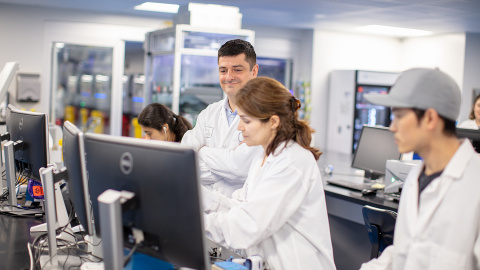- By Jessica Profato, MS, CGC
- Posted May 7, 2019
RNA Genetic Testing Brings Clarity to Lynch Syndrome Patients
MSH2 is one of five genes associated with Lynch syndrome, a condition that leaves patients with a significantly increased risk for colorectal and certain other cancers. Using genetic testing to identify patients with Lynch syndrome is important because they can be recommended increased cancer screenings for early detection and prevention.…
- By Monalyn Umali Salvador, MS, CGC
- Posted April 4, 2019
Paired Tumor/Germline Testing for Lynch Syndrome
When I think back to the initial discussions about what is now TumorNext-Lynch, I remember a vision to offer a comprehensive and convenient test that would be able to confirm a diagnosis or indicate a significantly reduced likelihood of Lynch syndrome. It was clear that the best approach to achieve this was to develop a paired tumor/germline…
- By Ambry Genetics
- Posted March 28, 2019
DTC Genetic Testing vs Clinical Testing | Direct To Consumer
Clinical genetic testing – the process of examining our hereditary makeup in a laboratory to help diagnose, treat and even predict disease - has evolved to become a critical component of medical practice and research. But now, with the advent of direct-to-consumer (DTC) genetic tests, people are being offered quick and easy genetic information…
- By Andy Castro
- Posted March 12, 2019
Food for Thought: Genetic Testing and the Fight Against Familial Hypercholesterolemia
Summer has arrived, and with it comes our seasonal obsession with barbecues, ice cream, and other less-than-healthy (but delicious, nonetheless) food options. Most of us will just be putting our beach bodies in jeopardy with our overindulgence, but for a large portion of the population, there will something much greater at stake: a significantly…
- By David Pfeifer
- Posted February 20, 2019
New and Improved Cardio Menu For Genetic Testing
Ambry is dedicated to finding answers for patients. We have made significant updates to our cardiovascular test menu to increase the identification of patients with heritable cardiovascular and lipid disorders, so that you can provide a clear diagnosis and guide personalized medical management for more families. New Tests Test Name Test…
- By Ambry Genetics
- Posted February 14, 2019
February is National Cancer Prevention Month
February is National Cancer Prevention Month Since cancer touches so many lives, it is fitting that an entire month is dedicated to building awareness of the many strides being made in unlocking its secrets. Every day, more is discovered that enables earlier and more accurate risk assessment, detection and precise treatment. One of the most difficult…
- By Jessica Profato, MS, CGC
- Posted January 4, 2019
3 Common Questions from Healthcare Providers about Genetic Testing
An estimated 266,000 women and 2,500 men will be diagnosed with breast cancer this year alone, and up to 10% of these may be hereditary. That’s over 26,000 patients and families whose lives could be significantly impacted by genetic testing, which can help guide personalized risk counseling and medical management. Multigene panels, like BreastNext,…
- By Virginia Speare, PhD, CGC
- Posted November 20, 2018
Answering 4 Important Questions about Genetic Testing for Hereditary Pancreatic Cancer
Hearing the words pancreatic cancer brings to mind thoughts of my neighbor, a gentle man and a physician well loved by the community, who in the 1990s suddenly was diagnosed with this disease and passed away. Pancreatic cancer is rare until you know someone who has the disease. With so many advancements in our understanding of pancreatic cancer,…
- By Alexandria Meyer
- Posted November 8, 2018
I am a Genetic Counselor- What Does That Mean?
“Genetic counselor” is not just a job title, though it is one that I have been enormously proud to carry for the past 10 years. In that time, I have come to primarily think of “genetic counselor” as a term which embodies a skill set. Just like Liam Neeson in “Taken,” we have a very special set of skills, however, our skills allow…
- By Carrie Horton, MS, CGC
- Posted October 3, 2018
Science In 60: Looking Beyond BRCA 1/2 to Identify Women at Risk for Breast Cancer
The adoption of multi-gene panel testing (MGPT) has been a game changer in the hereditary breast cancer arena. As evidence surrounding the growing number of breast cancer predisposition genes has accumulated, ATM, CHEK2, and PALB2 have stood out and become undisputed susceptibility genes conferring a moderate risk for…









